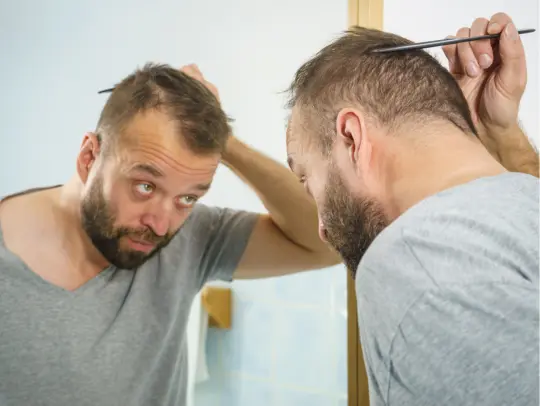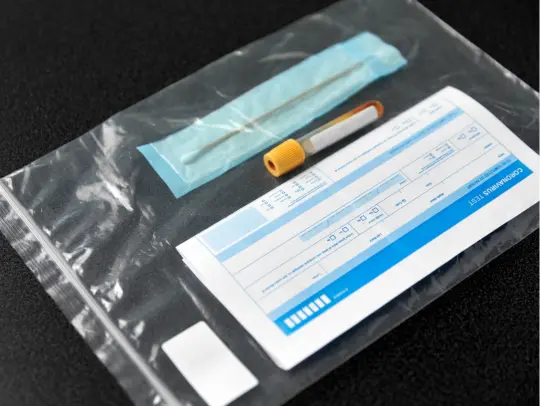
Nurse Practitioner Clarissa - Breaking the Silence: Understanding and Treating Pain During Sexual Intercourse
Breaking the Silence: Understanding and Treating Pain During Sexual Intercourse
Pain during sexual activity is a topic shrouded in silence. Yet it affects countless individuals, casting a shadow on their most intimate moments. This article discusses the causes—both physical and psychological—and offers a beacon of hope with strategies and treatments to overcome this barrier, aiming to restore not only physical comfort but also the emotional bond that pain has strained.
What is Pain During Intercourse?
Pain during intercourse, medically referred to as dyspareunia, is an issue that can affect individuals of any gender, though it's more commonly reported among women. This discomfort can occur before, during, or after sexual intercourse, impacting emotional intimacy, relationship satisfaction, and personal well-being.
Understanding what causes this pain and how it can be addressed is essential for those experiencing it as well as for their partners.
Pain during intercourse is more than just a physical issue. It can also have psychological components. It's characterized by persistent or recurrent genital pain that occurs just before, during, or after intercourse. The experience of this pain can vary greatly in intensity, from mild discomfort to severe pain that prevents sexual activity altogether.
What Causes Pain During Intercourse?
The causes of pain during intercourse are diverse and can be broadly categorized into physical and psychological factors. Understanding these causes is the first step toward finding effective solutions.
Physical Causes
Infections
Yeast infections, urinary tract infections (UTIs), or sexually transmitted infections can cause pain due to inflammation and irritation of sensitive genital tissues. These conditions often create burning, itching, or stinging sensations during intercourse.
Hormonal Changes
Decreased estrogen levels, particularly during menopause, breastfeeding, or certain medical treatments, can lead to vaginal dryness and elasticity changes, making intercourse painful. These hormonal fluctuations reduce natural lubrication and can thin vaginal tissues, making them more susceptible to irritation.
Medical Conditions
Certain conditions such as endometriosis, pelvic inflammatory disease, fibroids, and irritable bowel syndrome can contribute to deep pain during or after intercourse. These conditions can cause inflammation, create pressure on sensitive areas, or result in referred pain during sexual activity.
Physical Injuries or Surgeries
Past surgeries, episiotomy, or injuries to the pelvic area can lead to pain during intercourse due to scar tissue formation or altered anatomy. These physical changes can create tension, restriction, or direct pain when pressure is applied during intercourse.
Psychological Causes
Mental Health Issues
Anxiety, depression, and stress can affect sexual function, leading to or exacerbating pain during intercourse. These conditions can interfere with arousal, cause muscle tension, or create anticipatory anxiety about pain that becomes a self-fulfilling cycle.
History of Sexual Trauma
Past trauma can manifest as physical pain during sexual activities. The body's protective response to previous negative experiences can create involuntary muscle tension, anxiety, or dissociation that results in physical discomfort.
Relationship Issues
Emotional closeness and trust are crucial for a satisfying sexual experience. Lack of communication, unresolved conflicts, or intimacy issues can contribute to discomfort or pain. These factors can reduce arousal, increase muscle tension, or create emotional barriers that manifest physically.
Treatment Approaches: What Can Be Done to Help?
Addressing pain during intercourse requires a multifaceted approach, tailored to the underlying causes. Here are several strategies that can help manage or resolve this issue:
Medical Treatment
For infections or medical conditions, consulting a healthcare provider for appropriate treatment is crucial. This may include antibiotics for infections, specialized medications for conditions like endometriosis, or surgical interventions for structural issues. Hormone therapy may be recommended for those experiencing hormonal imbalances, particularly during menopause or other transitional periods.
Lubricants and Moisturizers
Over-the-counter lubricants can alleviate discomfort due to vaginal dryness during sexual activity, while vaginal moisturizers can help maintain vaginal health and comfort between sexual encounters. These products come in various formulations to suit different needs and sensitivities.
Pelvic Floor Physical Therapy
Specialized physical therapy can address musculoskeletal issues contributing to pain, improving pelvic floor function and reducing discomfort. These therapists can teach techniques to relax tense muscles, improve blood flow, and reduce pain through targeted exercises and manual therapy.
Psychotherapy
For psychological causes, therapy can be beneficial. Sex therapy or couples counseling can help address emotional or relational factors influencing pain during intercourse. These therapeutic approaches can help process trauma, reduce anxiety, improve communication, and develop healthy coping strategies.
Mindfulness and Relaxation Techniques
Practices like mindfulness, yoga, and meditation can help manage anxiety and stress, reducing the psychological impact on sexual health. These techniques promote body awareness, reduce muscle tension, and help individuals stay present during intimate encounters rather than anticipating pain.
Education and Communication
Understanding one's own sexual health and communicating openly with partners about preferences, discomforts, and pain can lead to adjustments in sexual practices that minimize pain. This might include exploring different positions, pacing, or activities that provide pleasure without discomfort.
Surgical Interventions
In cases where physical anomalies or severe conditions are identified, surgical options may be considered to alleviate pain. These procedures range from minimally invasive techniques to more complex surgeries depending on the underlying issue and its severity.
Seeking Professional Help
It's important for individuals experiencing pain during intercourse to seek professional medical advice. A healthcare provider can offer a thorough evaluation to identify the specific causes and recommend an appropriate treatment plan.
Remember, pain during intercourse is a common issue and with the right approach, it can often be effectively managed or resolved. Taking the first step toward addressing this issue can lead to improved physical comfort, emotional well-being, and relationship satisfaction.
Breaking the silence around this topic is essential for those affected to know they're not alone and that help is available. With proper care and patience, many individuals can reclaim their intimate lives and experience sexual activity without pain or fear.
























































































